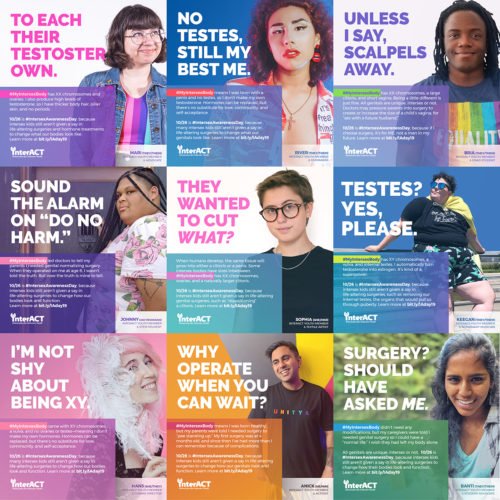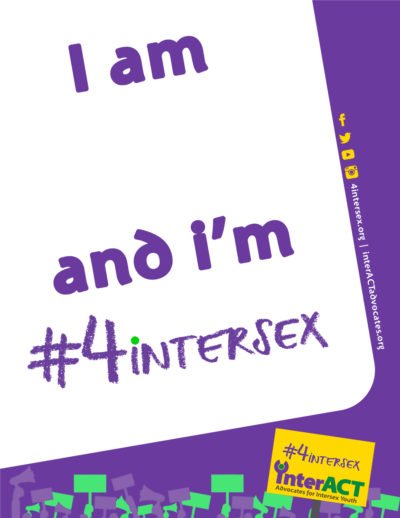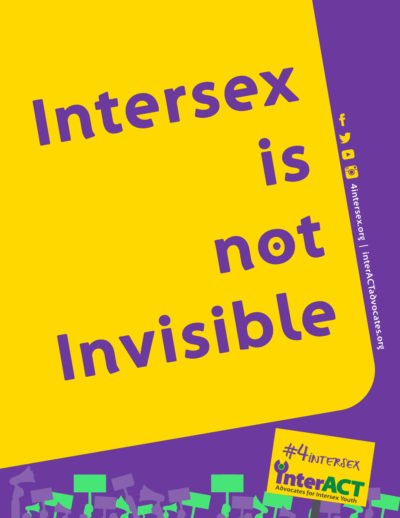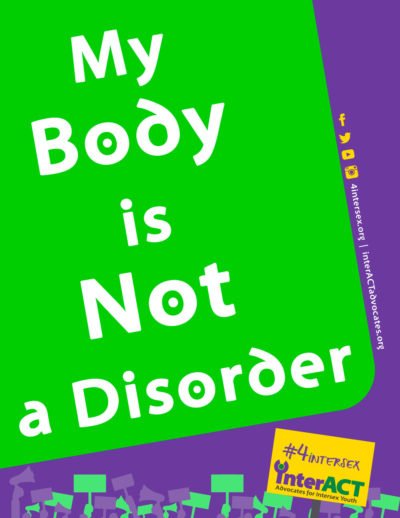Intersex Awareness Day
Image description: Blog banner that has text “Intersex Awareness Day - October 26”. Background is different colour yellow triangles and two large purple circles.
October 26 is Intersex Awareness Day. We’ve gathered some resources and facts to learn more!
Intersex?
“The I in LGBTQIA+ stands for “intersex.”
Intersex is an umbrella term for differences in sex traits or reproductive anatomy. Intersex people are born with these differences or develop them in childhood. There are many possible differences in genitalia, hormones, internal anatomy, or chromosomes, compared to the usual two ways that human bodies develop.
Some intersex traits are noticed at birth. Others don’t show up until puberty or later in life. Intersex people often face shame—or are forced or coerced into changing their bodies, usually at a very young age. Most surgeries to change intersex traits happen in infancy.
The word intersex also invokes a community. Intersex people are diverse, coming from all socioeconomic backgrounds, races, ethnicities, genders and orientations, faiths, and political ideologies. We are united by
our experiences living with variations in our sex traits,
the belief that these differences are a natural part of human diversity,
the idea that people deserve their own choices about their own bodies.”
From InterACT
“Often, intersex people get surgeries that they don’t want and transgender people have to fight for surgeries they do want.”
InterFacts
About 1.7% of people are born intersex.
Compared to a ~0.3% chance of having identical twins!
1 in 2,000 babies (0.05% of humans) are born with genital differences that a doctor might suggest changing with unnecessary surgery.
Being intersex is a common as having red hair or green eyes
From InterACT
30 organisations came together to draw up the Malta Declaration, highlighting the demands and recommendations of the international intersex movement.
There are at least 40 distinct different intersex variations




What happens when someone is born intersex?
“Most of the time when a baby is born intersex, doctors and the family decide on a sex, either male or female, and raise the baby as the gender expected of that sex. It’s pretty common for surgery to be done on the baby’s genitals and also for the child to be given hormones to make them fit into male/female categories as they go through puberty.
But activism by and for intersex people is growing, leading to some changes in our culture, which right now treats intersex as a medical problem instead of a natural, healthy way bodies can be. Today, more and more people believe unnecessary surgery and other medical interventions shouldn’t be done on intersex babies and children at all. Instead, intersex people should be able to decide for themselves when they’re older if they want treatment or surgery.
If you have a child who’s intersex, the best thing you can do is support them and love them for who they are. It’s also a good idea to find some support from other parents with children who are intersex, and make sure your child has opportunities to connect with other children who are intersex.”
From Planned Parenthood
Is intersex a gender identity?
“Not strictly, just like people with a non-intersex body, people with intersex variation can have many different gender identities. Many intersex people consider intersex to be something that a medical professional assigned or diagnosed them with and therefore do not consider it an identity.
What are the differences between intersex and trans people?
Intersex variation is a medical diagnosis that indicates someone’s sex characteristics do not conform to medical and societal expectations of what bodies look like.
Trans people have a gender identity that is not the same as the sex they were assigned at birth.
Intersex people are subjected to non-consensual and harmful surgeries and drugs.
Trans people often seek surgical changes and hormone therapy, yet they may have a hard time getting the medical attention they need.”
From Egale
Intersex Myths
Everybody is either born male or female
Being intersex is very rare
Being intersex is a condition that needs to be corrected
Intersex people are transgender
No one is speaking out for intersex people
Bust all of these myths at Amnesty International
“Many people I know really like their intersex body. It’s the expectations from people around them that makes things hard.”
More Resources
Intersex FAQ by InterACT
‘Supporting Your Intersex Child’ by Egale
Supporting Intersex Inclusion in the Workplace by InterACT and Out & Equal
Affirming Primary Care for Intersex People (A Guide for Doctors) by InterACT
Supporting Your Intersex Child - A Parent’s Toolkit by Organization Intersex International Europe
Intersex for Allies by Intersex Human Rights Australia
Never miss a post! Keep in touch with DWS…
